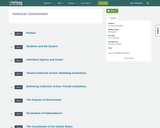
- Subject:
- Arts and Humanities
- Material Type:
- Full Course
- Provider:
- Rice University
- Provider Set:
- OpenStax College
- Date Added:
- 01/06/2016



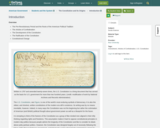
The Pre-Revolutionary Period and the Roots of the American Political Tradition
The Articles of Confederation
The Development of the Constitution
The Ratification of the Constitution
Constitutional Change
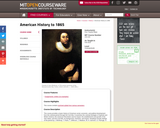
This course provides a basic history of American social, economic, and political development from the colonial period through the Civil War. It examines the colonial heritages of Spanish and British America; the American Revolution and its impact; the establishment and growth of the new nation; and the Civil War, its background, character, and impact. Readings include writings of the period by J. Winthrop, T. Paine, T. Jefferson, J. Madison, W. H. Garrison, G. Fitzhugh, H. B. Stowe, and A. Lincoln.

On 12 September 1787, during the final days of the Constitutional Convention, George Mason of Virginia expressed the desire that the Constitution be prefaced by a Bill of Rights. Elbridge Gerry of Massachusetts proposed a motion to form a committee to incorporate such a declaration of rights; however the motion was defeated. This lesson examines the First Congress's addition of a Bill of Rights as the first ten amendments to the Constitution.
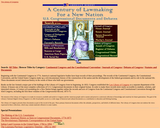
This site includes documents from the Continental Congress, the Constitutional Convention and ratification debates, and the first two federal congresses. These documents record American history in the words of those who built our government.
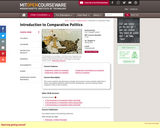
This class first offers some basic analytical frameworks -- culture, social structure, and institutions -- that you can use to examine a wide range of political outcomes. We then use these frameworks to understand (1) the relationship between democracy and economic development and (2) the relative centralization of political authority across countries. We will use theoretical arguments and a wide range of case studies to address several questions: Why are some countries democratic and others not? How does democracy affect economic development and political conflict? Why do some countries centralize power while others threaten to fall apart through secession and civil war? We will use examples from a wide range of countries including Argentina, Brazil, Germany, Iraq, Italy, Mexico, and the United States. The lessons drawn from these countries will prepare you to analyze other countries of your own choosing in the paper assignments. At the end of the course, you should be able to analyze political events around the world, drawing on the theoretical explanations provided in the class.

In this lesson, students will experience the internment of Japanese Americans from San Francisco's Fillmore neighborhood. By connecting local experiences with national events, students will understand both the constitutional issues at stake and the human impact of this government policy.
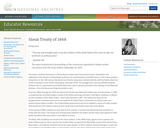
This lesson examines Native American sovereignty and the Constitutional power granted to the president and the Senate to make treaties with foreign nations. The site presents the Treaty and related documents, including a photograph of the Indian leader, Spotted Tail. Explanatory text, materials for teachers, and links to further resources accompany the documents.
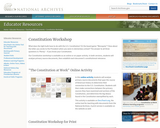
This is a self-service online workshop for teachers who use primary documents to help students see the impact and ongoing relevance of the Constitution. It requires little advance preparation and provides everything needed, including a vocabulary list, document analysis worksheets, and historical documents -- John Marshall's Supreme Court nomination (1801), proclamation to New Orleans (1803), Lincoln's telegram to Grant (1864), Johnson oath photo (1963), and more.